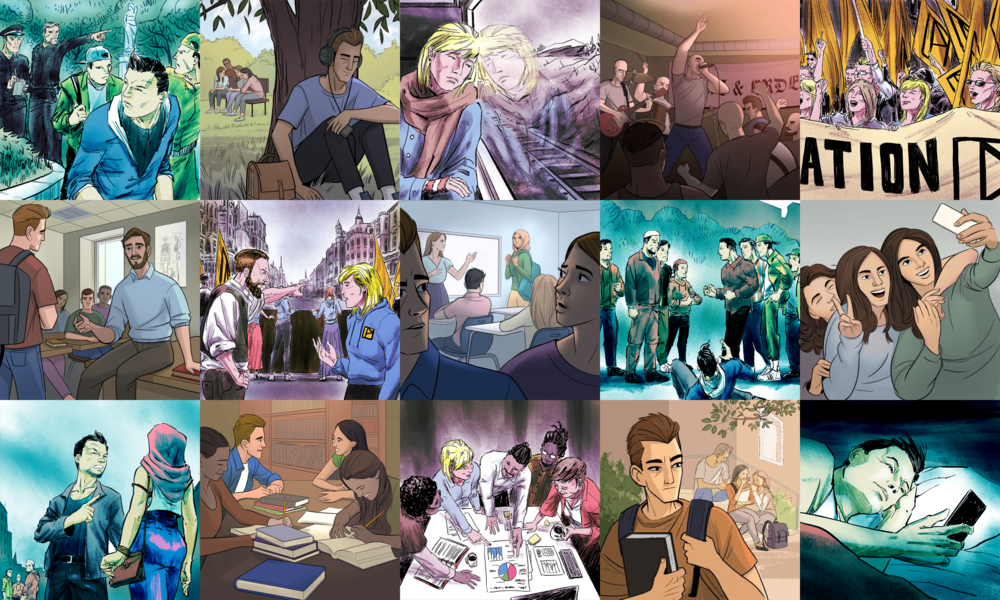Radicalisation
Blog
What role does the Internet play in radicalisation and offending for convicted extremists?
November 10, 2021By Jonathan Kenyon As society has embraced the Internet, opportunities for those wanting to use the online space for terrorist purposes have also grown, resulting in the spread of violent extremism and extremist ideologies within communities. Radicalisation is viewed as becoming increasingly covert, causing problems for security and intelligence services tasked with tackling this threat. ...
Blog
Is It Just a Game? Exploring the Intersection Between (Violent) Extremism and Online Video-Gaming
September 29, 2021By Suraj Lakhani There has been, especially of late, increasing concern over the misuse of video-games and associated (adjacent) platforms (e.g. Steam, Discord, Twitch, DLive) for the purposes of extremism and violent extremism. Across the European Union (and for that matter globally), policymakers, law enforcement, academics, and counter-extremism practitioners have started to engage more on ...
Blog
Tackling Online Radicalization at Its Offline Roots
February 3, 2021Want to submit a blog post? Click here. By William Baldét You would be forgiven for thinking that the advent of Covid-19 and the accompanying lockdowns have led to the mass radicalization of our youth, consigned to cyberspace, and exposed to vast swathes of online terrorist propaganda. It’s true that cases of ‘self-radicalization’ in the ...
Blog
What We Get Wrong About Online Radicalization
November 18, 2020By Dimitrios Kalantzis Less than 24 hours after John Earnest opened fire at a San Diego-area synagogue killing one person and injuring three others, the focus of the developing story shifted to his digital life. News outlets reported that Earnest “posted an anti-Jewish screed online about an hour before the attack” and “praised the suspects ...
Blog
The Name of the Game in Radicalisation Prevention
September 23, 2020By Michael Hartinger and Daniela Pisoiu Radicalisation and recruitment to violent extremism and terrorism occur in various ways and a myriad of rhetorical and visual elements have been used to that extent, increasingly online. Gamification and actual video games have recently increased in relevance, as Islamist and right-wing groups have recognised their potential for attracting ...
Blog
Implementing Virtual Reality into UK Education Models to Counter Online Radicalisation
September 9, 2020By Alice Raven Young people remain identified as one of the most vulnerable groups at risk of online radicalisation in the UK, however using education institutions to engage with and build resilience amongst these groups remains a persistent challenge. Virtual reality as an alternative resource has been increasingly explored to help bridge the gap between ...
Blog
The Role of the Internet in Facilitating Violent Extremism, Part II: Connecting On- and Offline Worlds
July 29, 2020This article is the second of a two-part series. It summarizes a recent study published in Terrorism and Political Violence. Part I is HERE. By Tiana Gaudette, Ryan Scrivens, and Vivek Venkatesh Last week on the Blog, we argued that, while a growing body of evidence suggests that the Internet is a key facilitator of ...
Blog
The Role of the Internet in Facilitating Violent Extremism, Part I: Insights from Former Right-Wing Extremists
July 22, 2020This article is the first of a two-part series. It summarizes a recent study published in Terrorism and Political Violence. Part II is HERE. By Tiana Gaudette, Ryan Scrivens, and Vivek Venkatesh In the past five years, it has become increasingly common for practitioners and policymakers in the western world to draw from the insights ...
Blog
Jumanji Extremism? The Potential Role of Gamification and Games in Radicalisation Processes
July 8, 2020By Linda Schlegel The ‘gamification of terror’ has received increased attention in the last years, especially in the aftermath of the right-wing extremist attacks in Christchurch, El Paso and Halle, which were livestreamed by the perpetrators akin to ‘Let’s Play’ streams found in the gaming scene. Previously, ISIS had made headlines, because it used not ...
Blog
Kimberly Pullman: A Canadian Woman Lured Over the Internet to the ISIS Caliphate
April 22, 2020By Anne Speckhard “If I was going to die at least I could die helping children. [It’s] illogical that you are entering a war zone that you don’t know anything about … I felt if I did something good it would overwrite the bad that had happened.” — Canadian 46-year-old Kimberly Pullman, speaking about her decision ...









